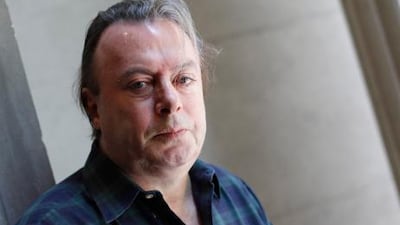WASHINGTON // The renowned British writer and polemicist Christopher Hitchens, whose targets ranged from God and Mother Teresa to Henry Kissinger, has died after an 18-month battle against cancer. He was 62.
Hitchens started his career in London but moved to the United States in 1981, enjoying great success on account of his elegant prose and outspoken views accompanied by a swaggering demeanour.
Vanity Fair, for whom Hitchens worked for the past 19 years, said the writer died on Thursday from pneumonia, a complication of his cancer of the esophagus, at the MD Anderson Cancer Center in Houston, Texas, with friends at his side.
In an online announcement, the magazine described him as an "incomparable critic, masterful rhetorician, fiery wit, and fearless bon vivant."
"At the end, Hitchens was more engaged, relentless, hilarious, observant, and intelligent than just about everyone else, just as he had been for the last four decades," it said.
"May his 62 years of living, well, so livingly console the many of us who will miss him dearly."
Hitchens, who had lived in Washington since 1982, was diagnosed in June 2010 and later underwent chemotherapy.
He learned of his illness soon after publishing "Hitch-22," a memoir which documented a prolific career in which he became notorious for heavy smoking and drinking while at the same time producing countless articles and books.
Cancer robbed Hitchens of his voice and hair but he continued to document his declining health in his Vanity Fair column.
"My chief consolation in this year of living dyingly has been the presence of friends," he wrote in the June 2011 issue.
Salman Rushdie, whom Hitchens supported when Iran's supreme leader Ayatollah Khomeini pronounced a death sentence on Rushdie for allegedly insulting Islam with his novel "The Satanic Verses," paid tribute on Twitter.
"Goodbye, my beloved friend. A great voice falls silent. A great heart stops. Christopher Hitchens, April 13, 1949-December 15, 2011," he wrote.
Graydon Carter, who signed Hitchens up after taking over as editor of Vanity Fair in 1992, said Hitchens was "a man of insatiable appetites -- for cigarettes, for scotch, for great writing, and above all, for conversation."
"You'd be hard-pressed to find a writer who could match the volume of exquisitely crafted columns, essays, articles, and books he produced over the past four decades," Carter wrote in an online tribute.
Britain's deputy prime minister Nick Clegg, who once worked for Hitchens as an intern, said the writer was "everything a great essayist should be: infuriating, brilliant, highly provocative and yet intensely serious."
"He will be massively missed by everyone who values strong opinions and great writing," Clegg added.
But in a reminder that Hitchens, an avowed atheist, offended possibly as many people as he attracted praise from, India's Missionaries of Charity order, said it would pray for his soul despite his aggressive stance against its Nobel prize-winning founder, Mother Teresa.
In a 1995 book "The Missionary Position" and a 1994 documentary called "Hell's Angel", Hitchens accused Mother Teresa of being a political opportunist who struck friendships with dictators and corrupt financiers in exchange for donations. He also said the nun had contributed to the misery of the poor with her strident opposition to contraception and abortion.
In the past 12 months Hitchens, who studied at Oxford, had written about troubled US-Pakistani relations in the wake of Osama bin Laden's death, and on the future of democracy in Egypt following the Arab Spring uprisings.
In the course of a career in which he wrote 25 books -- including works on Thomas Jefferson and George Orwell -- he clashed frequently with those whom he attacked.
In "The Trial of Henry Kissinger," he branded president Richard Nixon's foreign policy chief a war criminal for what he said were murderous policies in Vietnam, Chile and Bangladesh.
Hitchens also lambasted president Bill Clinton in a book entitled "No one Left To Lie To: The Values of The Worst Family," and pursued his case against religion in "God Is Not Great," in 2007.
Although he ended his life on the political right-wing, he started out on the left, working for the International Socialist magazine and later the New Statesman, where he fiercely opposed the Vietnam War.
But after the September 11 attacks in the United States a decade ago he embraced an interventionist foreign policy and supported the Iraq War, having denounced what he called "fascism with an Islamic face."
He leaves a wife, the American writer Carol Blue, and three children, two of whom are from an earlier marriage.

